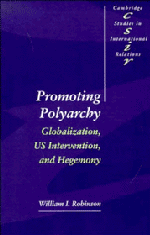Book contents
- Frontmatter
- Contents
- Acknowledgments
- List of acronyms and abbreviations
- Introduction. From East–West to North–South: US intervention in the “new world order”
- 1 From “straight power concepts” to “persuasion” in US foreign policy
- 2 Political operations in US foreign policy
- 3 The Philippines: “Molded in the image of American democracy”
- 4 Chile: Ironing out “a fluke of the political system”
- 5 Nicaragua: From low-intensity warfare to low-intensity democracy
- 6 Haiti: The “practically insolvable problem” of establishing consensual domination
- 7 Conclusions: The future of polyarchy and global society
- Notes
- Select bibliography
- Index
- CAMBRIDGE STUDIES IN INTERNATIONAL RELATIONS
1 - From “straight power concepts” to “persuasion” in US foreign policy
Published online by Cambridge University Press: 05 July 2011
- Frontmatter
- Contents
- Acknowledgments
- List of acronyms and abbreviations
- Introduction. From East–West to North–South: US intervention in the “new world order”
- 1 From “straight power concepts” to “persuasion” in US foreign policy
- 2 Political operations in US foreign policy
- 3 The Philippines: “Molded in the image of American democracy”
- 4 Chile: Ironing out “a fluke of the political system”
- 5 Nicaragua: From low-intensity warfare to low-intensity democracy
- 6 Haiti: The “practically insolvable problem” of establishing consensual domination
- 7 Conclusions: The future of polyarchy and global society
- Notes
- Select bibliography
- Index
- CAMBRIDGE STUDIES IN INTERNATIONAL RELATIONS
Summary
In all societies… two classes of people appear – a class that rules and a class that is ruled… The first class, always the less numerous, performs all political functions, monopolizes power and enjoys the advantages that power brings, whereas the second, the more numerous class, is directed and controlled by the first, in a manner that is now more or less legal, now more or less arbitrary and violent.
Gaetano MoscaThere has been an explosion of human interaction and correlatively a tremendous increase of social pressure. The social texture of human life has become more complex and its management more difficult. Dispersion, fragmentation, and simple ranking have been replaced by concentration, interdependence, and a complex texture… Because of the basic importance of the contemporary complex social texture, its management has a crucial importance, which raises the problem of social control over the individual… Because they (citizens) press for more action to meet the problems they have to face, they require more social control. At the same time they resist any kind of social control that is associated with the hierarchical values they have learned to discard and reject. The problem may be worldwide.
The Crisis of Democracy (1975 Trilateral Commission Report)How are we to understand our world? Our everyday experiences are played out in milieus. These milieus are linked to institutions that organize our lives and bind us to a great many people. Varied and encompassing combinations of institutions and their interrelations form social structures.
- Type
- Chapter
- Information
- Promoting PolyarchyGlobalization, US Intervention, and Hegemony, pp. 13 - 72Publisher: Cambridge University PressPrint publication year: 1996



